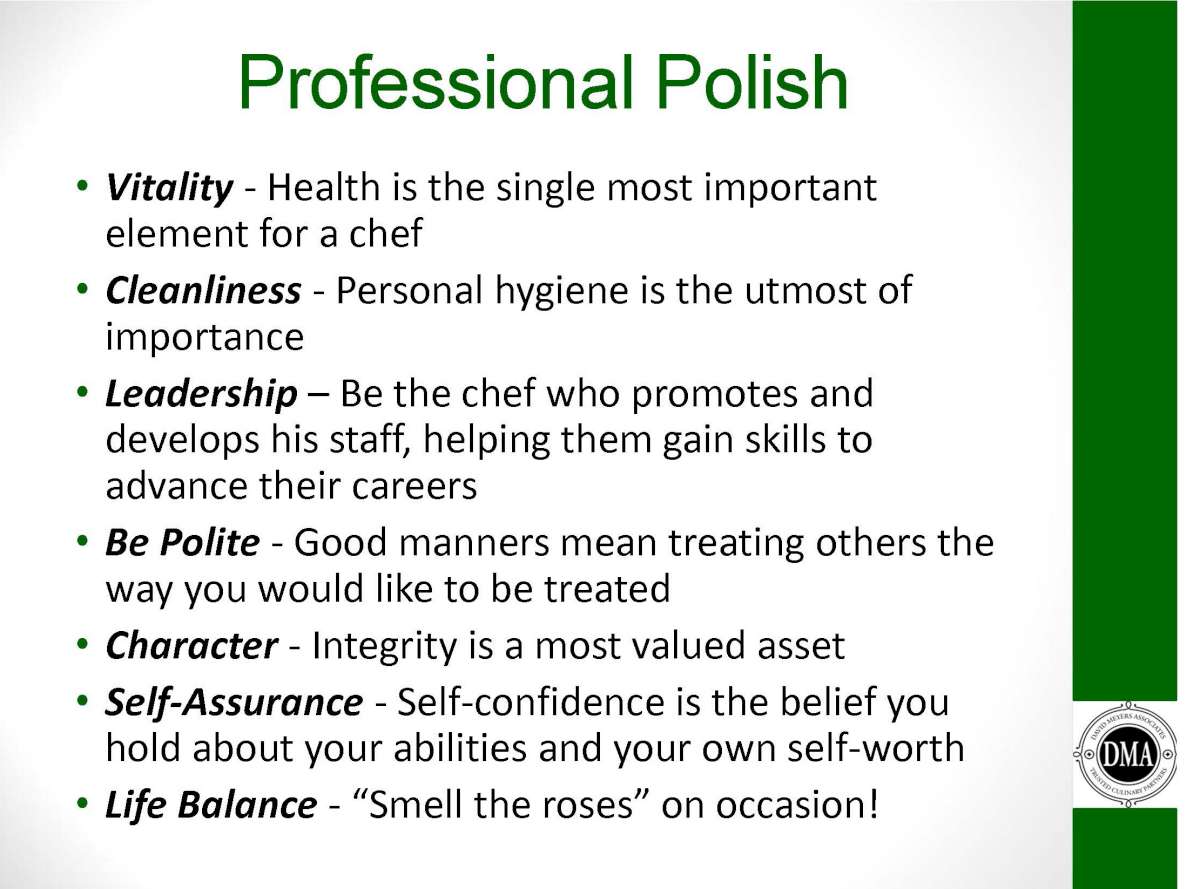Personal traits Professional Chef’s should aspire to.
By Bill Schulz, MCM
Did you ever wonder why – “When there are two Chefs having comparable experience and culinary skills with equal opportunity for advancement, one individual progress in his or her career while the other is stagnant?” The answer is ‘professional polish’. What personal traits does the progressive individual possess that the second individual does not? Most likely the progressive individual practices good personal hygiene, uniform is always clean and pressed, is confident in their abilities, is proficient in non-verbal communication skills, practices good manners and has the exceptional leadership skill.

Vitality: Above all, health is the single most important element for a chef to withstand the labor and stress of the kitchen. That being said, working out at the gym, biking to work or whatever one can do to maintain oneself physically is important. People will take the chefs instructions to the power of ten so he or she should be mindful of the power of both their statements and their actions. Working out daily takes the edge off and contributes to a more positive, patient attitude. Don’t neglect your annual physical, eye exam or check up with the dentist.
Cleanliness: Personal hygiene is the utmost of importance and expected when handling food. Well-groomed hair, clean and trimmed nails, shaven and not scruffy is expected. Oh yes, clean hat changed daily or as whenever soiled; dirty unlaundered baseball caps carry a lot of harmful bacteria and should be discouraged. The chef should be the example of high standards in a professional kitchen. Working scrupulously clean while executing their craft and displaying examples of “How to” by working among staff.
Leadership: Benevolent dictatorships just don’t work in operations any more, especially old school kitchens, times are changing. In our society the old ways of screaming at people just won’t fly. Nor does it make sense in terms of leadership. A chef who promotes and develops his staff, helping them gain skills to advance their careers, will be able to cover more tasks because his staff will become loyal, seeing his efforts to help them. Proper delegation is an art and your state of awareness are two skills that good chefs develop. Being around in key areas during peak service times is important. A chef’s presence can be calming and if the chef is seen coaching, leading, directing and pitching-in, they will have support from most everyone.
Being Polite: In dealing with people good manners and fairness will help gain respect as opposed alienation. In general, good manners mean treating others the way you would like to be treated. Like your grooming habits, your manners rub off on other club staff and can enhance your image with club members as well. Use phrases such as “sir,” “ma’am,” “it’s my pleasure,” “please,” and “thank you.” Being polite will go a long way toward leaving others with a favorable impression of you.
Character: Integrity is a most valued asset and should never be sacrificed. A good person, honest, trustworthy, complimentary and forthright in their pronouncements will be noticed. So too, will a bad one. Dependability and trust are traits any good chef should have. A chef should also display fairness, be truthful and bring forward any issues concerning the inappropriate or poor treatment of staff and associates.
Self-Assurance: Self-confidence is the belief you hold about your abilities and your own self-worth. You will find your job often tests your abilities and your sense of self-confidence. It is, however, very important that you do not become your own worst enemy. Nothing will booby-trap your success more quickly than undermining your self-confidence.
Life Balance: The aspect of a Chef’s personal life in the social or private side is equally as important as the business side. It is unhealthy for the chef to spend so much time at the club that his/her family is neglected and there is no time for personal enjoyment or exercise. Learn to step back and on occasion “smell the roses.” Remember, when you die, your gravestone will not state how many hours you spent at the club. Think about it and how important your loved ones and life itself are to you. One of the most common problems in clubs are Chef’s living imbalanced lifestyles. It is a disease with many symptoms but the same root cause. You can become imbalanced with anything being a workaholic, over-eating, excessive drinking, playing too much golf, and so on.
The fact is many Chefs tend to pay more attention to their kitchens needs than to their families’ needs. The results of imbalance are always the same, frustration and fatigue, too tired or too busy to spend time with the children or arguing and never being available for the spouse. According to national statistics, ending the marriage in divorce happens 50% of the time. Imbalance eventually leads to burnout.
With all of the pressure and stress in today’s society, it is easy to run out of emotional energy. Whatever you call it, depression, burnout, stress symptoms, it is an inescapable warning light that something is seriously out of balance, and changes must be made. Learn to make time for family and friends.
Finally, remember, you only get one chance to make a first impression and you want that impression to be positive. First impressions in the club should not be considered the first day on the job. First impressions happen throughout the day, every day, and every week throughout the year.

